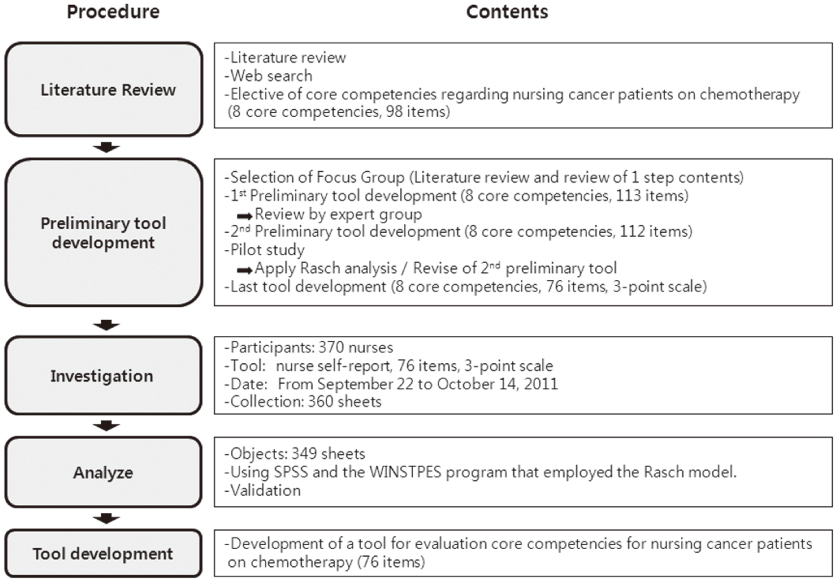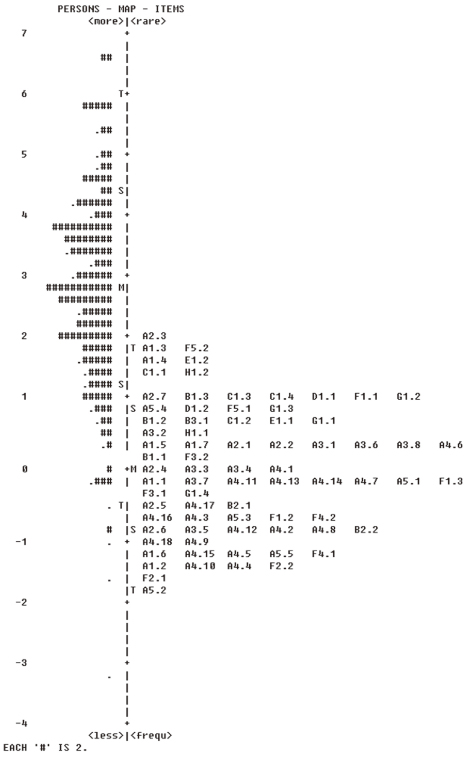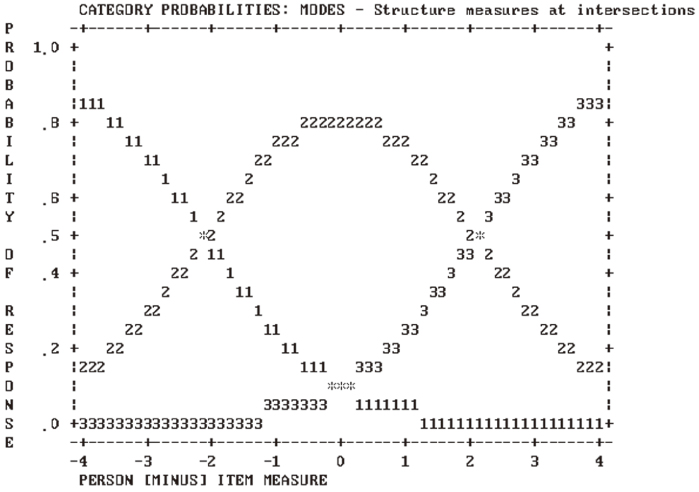J Korean Acad Nurs.
2012 Oct;42(5):632-643. 10.4040/jkan.2012.42.5.632.
Development and Validation of a Tool for Evaluating Core Competencies in Nursing Cancer Patients on Chemotherapy
- Affiliations
-
- 1Department of Medical Education, Kyung Hee University School of Medicine, Seoul Center for Innovation in Nursing Education, Chung Ang University Red Cross College of Nursing, Seoul, Korea. sunghae.kim@khu.ac.kr
- 2Department of Medical Education, Kyung Hee University School of Medicine, Seoul, Korea.
- KMID: 1499491
- DOI: http://doi.org/10.4040/jkan.2012.42.5.632
Abstract
- PURPOSE
This study was done to develop tool to evaluate the core competencies regarding nursing cancer patients on chemotherapy, and to verify the reliability and efficacy of the developed tool.
METHODS
A tool to evaluate the core competencies was developed from a preliminary tool consisting of 112 items verified by expert groups. The adequacy of the preliminary tool was analyzed and refined to the final evaluation tool containing 76 items in 8 core competencies and 18 specific competencies. The evaluation tool is in the form of a self-report, and each item is evaluated according to a 3-point scale. From September 22 to October 14, 2011, 349 survey responses were analyzed using SPSS 20.0 and the WINSTEPS program that employs the Rasch model.
RESULTS
Results indicated that there were no inappropriate items and the items had low levels of difficulty in comparison with the knowledge levels of the study participants. The results of factor analysis yielded 18 factors, and the reliability of the tools was very high with Cronbach's alpha=.97.
CONCLUSION
The results of this study can be used for training and evaluation of core competencies for nursing cancer patients, and for standardizing nursing practices associated with chemotherapy.
Keyword
MeSH Terms
Figure
Reference
-
1. Azzoli CG, Temin S, Aliff T, Baker S Jr, Brahmer J, Johnson DH, et al. 2011 focused update of 2009 American Society of Clinical Oncology Clinical Practice Guideline update on chemotherapy for stage IV non-small-cell lung cancer. J Clin Oncol. 2011. 29:3825–3831. http://dx.doi.org/10.1200/JCO.2010.34.2774.2. Berterö C, Chamberlain Wilmoth M. Breast cancer diagnosis and its treatment affecting the self: A meta-synthesis. Cancer Nurs. 2007. 30:194–202. http://dx.doi.org/10.1097/01.NCC.0000270707.80037.4c.3. Bond TG, Fox CM. Applying the Rasch model: Fundamental measurement in the human science. 2007. 2nd ed. New Jersey, NJ: Lawrance Erlbaum Associates Publisher London.4. Chi EL, Chae SH. Theory and practice of Rasch model. 2000. 1st ed. Gyeonggi-do: Kyoyook-kwahaksa.5. Choi JS, Eun Y. A study on the clinical competence according to clinical ladder of operating room nurses. J Korean Acad Soc Nurs Educ. 2006. 12:60–69.6. da Costa Vargens OM, Berterö CM. Living with breast cancer: Its effect on the life situation and the close relationship of women in Brazil. Cancer Nurs. 2007. 30:471–478. http://dx.doi.org/10.1097/01.NCC.0000300157.83144.fb.7. Ha NS, Choi J. An analysis of nursing competency affecting on job satisfaction and nursing performance among clinical nurses. J Korean Acad Nurs Adm. 2010. 16:286–294.8. Hall LW, Moore SM, Barnsteiner JH. Quality and nursing: Moving from a concept to core competency. Urol Nurs. 2008. 28:417–425.9. Kang YS, Lee SJ, Kim IJ, Ahn KH. A measurement scale development of nursing competence for nurses working in general wards. J Korean Acad Nurs Adm. 2008. 14:219–228.10. Kim GM, Park SY, Lee CH. A Rasch analysis of the Korean version of Oswestry Disability Questionnaire according to general characteristics of patients with low back pain. J Korean Acad Univ Trained Phys Ther. 2011. 18(2):35–42.11. Kim MY, Park SA. An methodology research of performance appraisal tool of oncology advanced practice nurse. J Korean Acad Nurs Adm. 2007. 13:17–23.12. Kim R, Sung DK, Lee HB, Song KS, Jo TK, Lee SC. Comprehension and utilize of statistic analysis. 2005. Daegu: Daemyung Press.13. Korean Accreditation Board of Nursing. Nursing education core competency assessment. 2011. Seoul: Author.14. Kwak MK, Kim EJ, Lee ER, Kwon IG, Hwang MS. Characteristics and quality of life in patients with chemotherapy-induced peripheral neuropathy. J Korean Oncol Nurs. 2010. 10:231–239. http://dx.doi.org/10.5388/jkon.2010.10.2.231.15. Lee IS, Hong SH, Shin EK. Rasch rating scale modeling of the disability identity scale. Korean J Soc Welf. 2007. 59(4):273–296.16. Lenburg CB. The framework, concepts and methods of the competency outcomes and performance assessment (COPA) model. Online J Issues Nurs. 1999. 4:Manuscript 2.17. Lenburg CB, Klein C, Abdur-Rahman V, Spencer T, Boyer S. The COPA model: A comprehensive framework designed to promote quality care and competence for patient safety. Nurs Educ Perspect. 2009. 30:312–317.18. Lynn MR. Determination and quantification of content validity. Nurs Res. 1986. 35:382–385.19. National Cancer Center, & Ministry of Health & Welfare. Cancer facts & figures 2011. 2011. Gyeonggi-do: Author.20. Park EY, Park SY. The analysis of the child-rearing attitude test appropriateness by Rasch rating scale modeling. Educ J Phys Mult Disabl. 2008. 51(4):117–136.21. Peppercorn JM, Smith TJ, Helft PR, Debono DJ, Berry SR, Wollins DS, et al. American Society of Clinical Oncology statement: Toward individualized care for patients with advanced cancer. J Clin Oncol. 2011. 29:755–760. http://dx.doi.org/10.1200/JCO.2010.33.1744.22. Scott Tilley DD. Competency in nursing: A concept analysis. J Contin Educ Nurs. 2008. 39:58–64. http://dx.doi.org/10.3928/00220124-20080201-12.23. Shin H, Kim BJ, Kang HS. Use of physical assessment skills and education needs of advanced practice nurses and nurse specialists. J Korean Acad Nurs. 2009. 39:709–719. http://dx.doi.org/10.4040/jkan.2009.39.5.709.24. Webb PM, Cummings MC, Bain CJ, Furnival CM. Changes in survival after breast cancer: Improvements in diagnosis or treatment? Breast. 2004. 13:7–14. http://dx.doi.org/10.1016/S0960-9776(03)00129-2.
- Full Text Links
- Actions
-
Cited
- CITED
-
- Close
- Share
- Similar articles
-
- The development of nurses’ core competencies and the analysis of validity and importance-performance
- Development of Objectives in Nursing Clinical Education based on the Nursing Core Competencies
- Strategy for Improving Core Nursing Competency-based Education
- Nursing Core Competencies Needed in the Fields of Nursing Practice for Graduates in Nursing
- Development of the Core Task and Competency Matrix for Unit Managers




